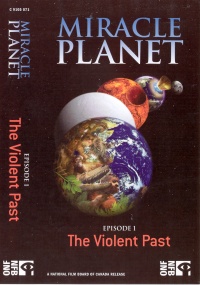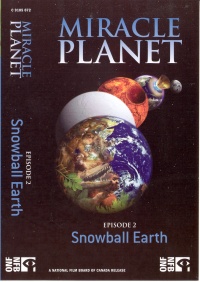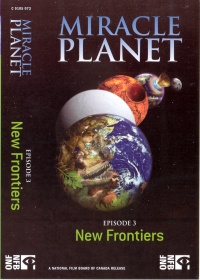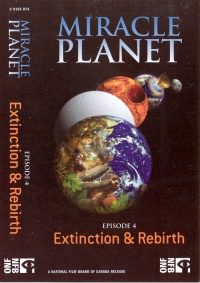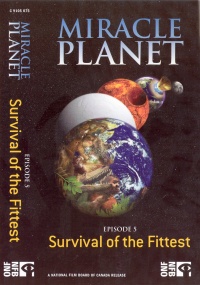| ________________
CM . . .
. Volume XII Number 16 . . . .April 14, 2006
Miracle Planet is a 5-video series co-produced by the NFB, NHK Japan, the Discovery Channel and the Science Channel. From it, we learn that the story of our planet is one in which fire and ice, heat and cold, desert and jungle have alternated, making our world the place that it is today. In Episode 1, The Violent Past, we learn (if we didn't already know) that the planet was born amidst a coalescence of gas and dust, a chance encounter of "chaos and disaster" and that, despite this difficult birth, microscopic organisms persevered against all odds to sow the earliest seeds of life. These organisms proved to be amazingly adaptable, capable of living through periods of incredible cold; for millions of years, Earth was a giant deep freeze, and Episode 2, Snowball Earth, describes the conditions of that first of several Ice Ages, in which, miraculously, life did survive. In Episode 3, New Frontiers, the Earth thawed, and life forms adapted, moving from the oceans onto land, spreading across the world as once-joined continents fractured and drifted apart. Then, something happened. Although we talk of "global climate change" as though it were new, it probably has happened before, and approximately 250 million years ago, it was the cause of mass extinction. Episode 4, Extinction and Rebirth, explores theories about that catastrophe, as well as why dinosaurs dominated the planet for millions of years. Their time came to an end as tiny mammals showed the ability to live and adapt, despite low levels of oxygen. And, they survived, largely due to good eyesight and prehensile hands - size was not their advantage. They also developed impressive brain power, and so, in Episode 5, Survival of the Fittest, we see that some primates began to walk upright, onto open grasslands, where their main defense against predators which could outrun them was the ability to fashion tools and weapons. How well that ability will serve the human species in the future is one of the questions with which viewers are left at the conclusion of the series. Miracle Planet is visually stunning; the production values are high, and powerful use has been made of computer simulation technology, as well as interviews with scientists researching the story of life on this planet. Each video runs to just under 50 minutes, and while each can be viewed on its own, each episode does assume a fairly high level of knowledge of the Earth's evolutionary history. Teachers of senior high school biology classes will find this series provides a truly comprehensive overview of the history of life on Earth. My only caution is that teachers might want to preview the videos in order to select the most relevant sections - there is so much packed into each episode that the most effective teaching strategy might be to choose portions which are particularly illustrative. It's not easy to find public performance video which brings to life the story of life on Earth, and Miracle Planet does an excellent job of filling that need. Highly Recommended. Joanne Peters is a teacher-librarian at Kelvin High School in Winnipeg, MB.
To comment
on this title or this review, send mail to cm@umanitoba.ca.
Copyright © the Manitoba Library Association. Reproduction for personal
use is permitted only if this copyright notice is maintained. Any
other reproduction is prohibited without permission.
NEXT REVIEW |
TABLE OF CONTENTS FOR THIS ISSUE
- April 14, 2006.
AUTHORS |
TITLES |
MEDIA REVIEWS |
PROFILES |
BACK ISSUES |
SEARCH |
CMARCHIVE |
HOME |
